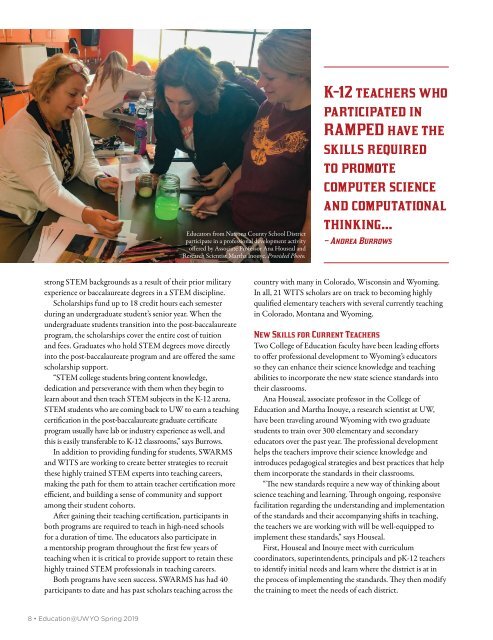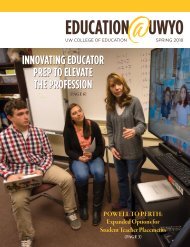University of Wyoming College of Education Spring 2019
Magazine for the University of Wyoming College of Education. #UWyoCoEd #UWyo
Magazine for the University of Wyoming College of Education. #UWyoCoEd #UWyo
You also want an ePaper? Increase the reach of your titles
YUMPU automatically turns print PDFs into web optimized ePapers that Google loves.
strong STEM backgrounds as a result <strong>of</strong> their prior military<br />
experience or baccalaureate degrees in a STEM discipline.<br />
Scholarships fund up to 18 credit hours each semester<br />
during an undergraduate student’s senior year. When the<br />
undergraduate students transition into the post-baccalaureate<br />
program, the scholarships cover the entire cost <strong>of</strong> tuition<br />
and fees. Graduates who hold STEM degrees move directly<br />
into the post-baccalaureate program and are <strong>of</strong>fered the same<br />
scholarship support.<br />
“STEM college students bring content knowledge,<br />
dedication and perseverance with them when they begin to<br />
learn about and then teach STEM subjects in the K-12 arena.<br />
STEM students who are coming back to UW to earn a teaching<br />
certification in the post-baccalaureate graduate certificate<br />
program usually have lab or industry experience as well, and<br />
this is easily transferable to K-12 classrooms,” says Burrows.<br />
In addition to providing funding for students, SWARMS<br />
and WITS are working to create better strategies to recruit<br />
these highly trained STEM experts into teaching careers,<br />
making the path for them to attain teacher certification more<br />
efficient, and building a sense <strong>of</strong> community and support<br />
among their student cohorts.<br />
After gaining their teaching certification, participants in<br />
both programs are required to teach in high-need schools<br />
for a duration <strong>of</strong> time. The educators also participate in<br />
a mentorship program throughout the first few years <strong>of</strong><br />
teaching when it is critical to provide support to retain these<br />
highly trained STEM pr<strong>of</strong>essionals in teaching careers.<br />
Both programs have seen success. SWARMS has had 40<br />
participants to date and has past scholars teaching across the<br />
Educators from Natrona County School District<br />
participate in a pr<strong>of</strong>essional development activity<br />
<strong>of</strong>fered by Associate Pr<strong>of</strong>essor Ana Houseal and<br />
Research Scientist Martha Inouye. Provided Photo.<br />
K-12 teachers who<br />
participated in<br />
RAMPED have the<br />
skills required<br />
to promote<br />
computer science<br />
and computational<br />
thinking...<br />
– Andrea Burrows<br />
country with many in Colorado, Wisconsin and <strong>Wyoming</strong>.<br />
In all, 21 WITS scholars are on track to becoming highly<br />
qualified elementary teachers with several currently teaching<br />
in Colorado, Montana and <strong>Wyoming</strong>.<br />
New Skills for Current Teachers<br />
Two <strong>College</strong> <strong>of</strong> <strong>Education</strong> faculty have been leading efforts<br />
to <strong>of</strong>fer pr<strong>of</strong>essional development to <strong>Wyoming</strong>’s educators<br />
so they can enhance their science knowledge and teaching<br />
abilities to incorporate the new state science standards into<br />
their classrooms.<br />
Ana Houseal, associate pr<strong>of</strong>essor in the <strong>College</strong> <strong>of</strong><br />
<strong>Education</strong> and Martha Inouye, a research scientist at UW,<br />
have been traveling around <strong>Wyoming</strong> with two graduate<br />
students to train over 300 elementary and secondary<br />
educators over the past year. The pr<strong>of</strong>essional development<br />
helps the teachers improve their science knowledge and<br />
introduces pedagogical strategies and best practices that help<br />
them incorporate the standards in their classrooms.<br />
“The new standards require a new way <strong>of</strong> thinking about<br />
science teaching and learning. Through ongoing, responsive<br />
facilitation regarding the understanding and implementation<br />
<strong>of</strong> the standards and their accompanying shifts in teaching,<br />
the teachers we are working with will be well-equipped to<br />
implement these standards,” says Houseal.<br />
First, Houseal and Inouye meet with curriculum<br />
coordinators, superintendents, principals and pK-12 teachers<br />
to identify initial needs and learn where the district is at in<br />
the process <strong>of</strong> implementing the standards. They then modify<br />
the training to meet the needs <strong>of</strong> each district.<br />
The team hosts workshops for the teachers and<br />
administrators at partner districts throughout the state. These<br />
workshops take place at facilities within the district and target<br />
specific groups <strong>of</strong> educators, usually K-5 and middle and high<br />
school science teachers in the district.<br />
Additionally, Houseal and Inouye hold open-enrollment<br />
workshops that any <strong>Wyoming</strong> educator can join. Those<br />
workshops were held on the UW campus this year in addition<br />
to a workshop on the Kelly Campus <strong>of</strong> Teton Science Schools.<br />
They plan to hold more <strong>of</strong> these workshops throughout the state<br />
with one already scheduled for Douglas in the next school year.<br />
During these workshops the cohort discusses how science<br />
can be integrated into other content areas or expanded<br />
to include other scientific disciplines. They also work to<br />
increase each teacher’s science knowledge base and provide<br />
new pedagogical strategies that encourage a student’s active<br />
engagement with science lessons.<br />
“We model best practice in all that we do, from the<br />
organization <strong>of</strong> the workshops to the evaluation, modification<br />
and development <strong>of</strong> curricular pieces and assessments. We<br />
<strong>of</strong>ten develop and implement model lessons with them to<br />
experience as students and evaluate as teachers,” says Houseal.<br />
The work Houseal and Inouye conduct with each partner<br />
school can vary greatly and goes much deeper than presenting<br />
workshops. The team spent six years working with the<br />
Campbell County School District in partnership with the<br />
curriculum coordinators and teachers to completely revamp<br />
the K-12 science curriculum, a process they are currently<br />
working toward in several other districts.<br />
The pr<strong>of</strong>essional development leaders may also visit the<br />
participants in their classrooms several times throughout<br />
the year to provide further input and coaching. Teachers can<br />
also send in videos <strong>of</strong> their teaching for Houseal and Inouye<br />
evaluate. This sustained intervention gives educators a deep<br />
understanding and allows them to constantly evolve their<br />
methods and best practices.<br />
Another <strong>College</strong> <strong>of</strong> <strong>Education</strong> faculty-led pr<strong>of</strong>essional<br />
development opportunity was initiated by Burrows and<br />
Mike Borowczak, an assistant pr<strong>of</strong>essor in the <strong>College</strong> <strong>of</strong><br />
Engineering and Applied Science. A three-year funded grant<br />
— Robotics, Applied Mathematics, Physics and Engineering<br />
Design (RAMPED) focuses on computer science. Over<br />
100 educators have benefited from the cross-disciplinary<br />
pr<strong>of</strong>essional development program since 2016.<br />
RAMPED is supported by a U.S. Department <strong>of</strong> <strong>Education</strong><br />
grant that is administered by a <strong>Wyoming</strong> Department <strong>of</strong><br />
<strong>Education</strong> Math and Science Partnerships grant. The program<br />
began its second iteration in summer 2018.<br />
RAMPED allows <strong>Wyoming</strong> teachers, regardless <strong>of</strong> the<br />
grade level or content area in which they teach, to work with<br />
experts at UW to gain new ideas and abilities to incorporate<br />
concepts <strong>of</strong> computer science, computational thinking and<br />
cybersecurity into their classrooms.<br />
“K-12 teachers who participated in RAMPED have<br />
the skills required to promote computer science and<br />
computational thinking to their students and dispel the myth<br />
that computer science is just coding, creating video games or<br />
robotics,” says Burrows.<br />
The training comes at a time when <strong>Wyoming</strong> is developing<br />
computer science standards for the state in addition to<br />
incorporating the new state science standards. These standards<br />
mandate that computer science and computational thinking<br />
be incorporated into the state educational program by the<br />
start <strong>of</strong> the 2022-23 school year.<br />
The program includes a two-week summer camp that<br />
occurs on the UW campus, as well as follow-up participant<br />
collaboration days that take place during the school year. The<br />
camp showcases ways that teacher participants can integrate<br />
computer science and computational thinking principles<br />
into their existing classrooms. This approach will help school<br />
districts meet the new requirements without additional<br />
financial burden.<br />
Although the focus is on teachers’ understanding<br />
and use <strong>of</strong> computer science and STEM content during<br />
RAMPED, <strong>Wyoming</strong> students are the real beneficiaries <strong>of</strong> the<br />
pr<strong>of</strong>essional development.<br />
“With well-prepared teachers, <strong>Wyoming</strong>’s K-12 students<br />
have the opportunity to explore STEM and computer science<br />
in meaningful experiences that can help them pursue careers<br />
in new industries that assist in diversifying the state’s economy.<br />
These experiences can also allow them to apply their computer<br />
science knowledge to solve problems in the industries that have<br />
driven <strong>Wyoming</strong>’s economic engine for decades,” says Burrows.<br />
read part two in our winter e-newsletter!<br />
The scattering <strong>of</strong> light is explored in this activity presented by Associate<br />
Pr<strong>of</strong>essor Ana Houseal and Research Scientist Martha Inouye during a<br />
pr<strong>of</strong>essional development opportunity. Provided Photo.<br />
8 • <strong>Education</strong>@UWYO <strong>Spring</strong> <strong>2019</strong> <strong>Education</strong>@UWYO <strong>Spring</strong> <strong>2019</strong> • 9



